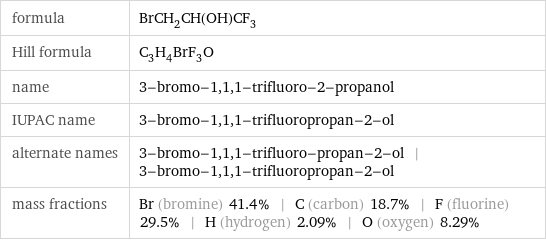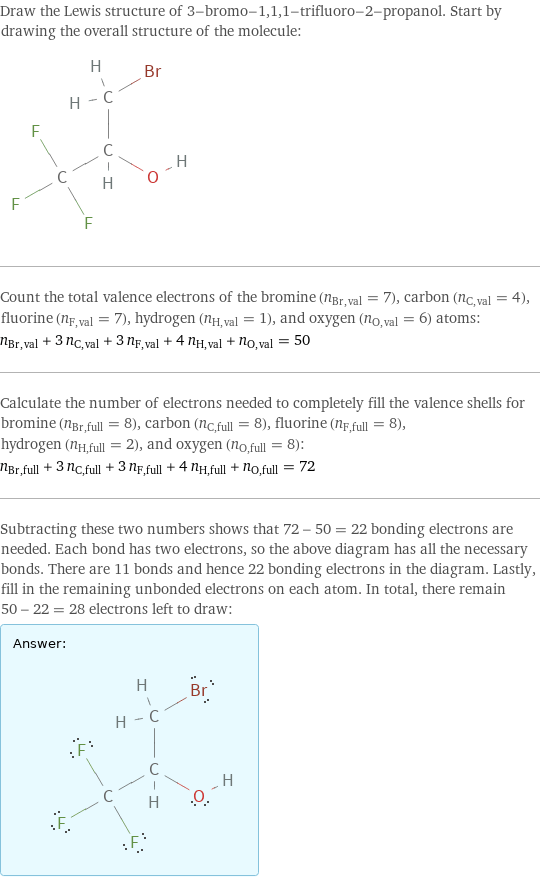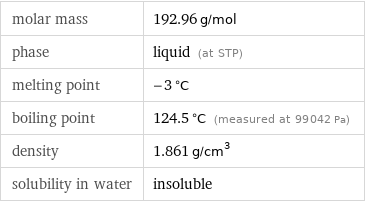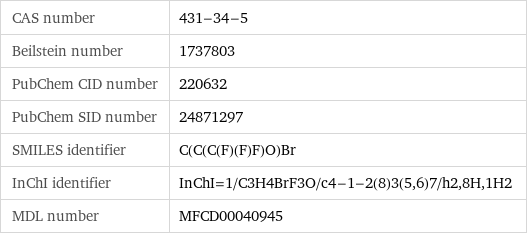Input interpretation

3-bromo-1, 1, 1-trifluoro-2-propanol
Chemical names and formulas

formula | BrCH_2CH(OH)CF_3 Hill formula | C_3H_4BrF_3O name | 3-bromo-1, 1, 1-trifluoro-2-propanol IUPAC name | 3-bromo-1, 1, 1-trifluoropropan-2-ol alternate names | 3-bromo-1, 1, 1-trifluoro-propan-2-ol | 3-bromo-1, 1, 1-trifluoropropan-2-ol mass fractions | Br (bromine) 41.4% | C (carbon) 18.7% | F (fluorine) 29.5% | H (hydrogen) 2.09% | O (oxygen) 8.29%
Lewis structure

Draw the Lewis structure of 3-bromo-1, 1, 1-trifluoro-2-propanol. Start by drawing the overall structure of the molecule: Count the total valence electrons of the bromine (n_Br, val = 7), carbon (n_C, val = 4), fluorine (n_F, val = 7), hydrogen (n_H, val = 1), and oxygen (n_O, val = 6) atoms: n_Br, val + 3 n_C, val + 3 n_F, val + 4 n_H, val + n_O, val = 50 Calculate the number of electrons needed to completely fill the valence shells for bromine (n_Br, full = 8), carbon (n_C, full = 8), fluorine (n_F, full = 8), hydrogen (n_H, full = 2), and oxygen (n_O, full = 8): n_Br, full + 3 n_C, full + 3 n_F, full + 4 n_H, full + n_O, full = 72 Subtracting these two numbers shows that 72 - 50 = 22 bonding electrons are needed. Each bond has two electrons, so the above diagram has all the necessary bonds. There are 11 bonds and hence 22 bonding electrons in the diagram. Lastly, fill in the remaining unbonded electrons on each atom. In total, there remain 50 - 22 = 28 electrons left to draw: Answer: | |
3D structure

3D structure
Basic properties

molar mass | 192.96 g/mol phase | liquid (at STP) melting point | -3 °C boiling point | 124.5 °C (measured at 99042 Pa) density | 1.861 g/cm^3 solubility in water | insoluble
Units

Liquid properties (at STP)

density | 1.861 g/cm^3 refractive index | 1.4
Units

Chemical identifiers

CAS number | 431-34-5 Beilstein number | 1737803 PubChem CID number | 220632 PubChem SID number | 24871297 SMILES identifier | C(C(C(F)(F)F)O)Br InChI identifier | InChI=1/C3H4BrF3O/c4-1-2(8)3(5, 6)7/h2, 8H, 1H2 MDL number | MFCD00040945
Safety properties

flash point | 43.33 °C

DOT numbers | 2929